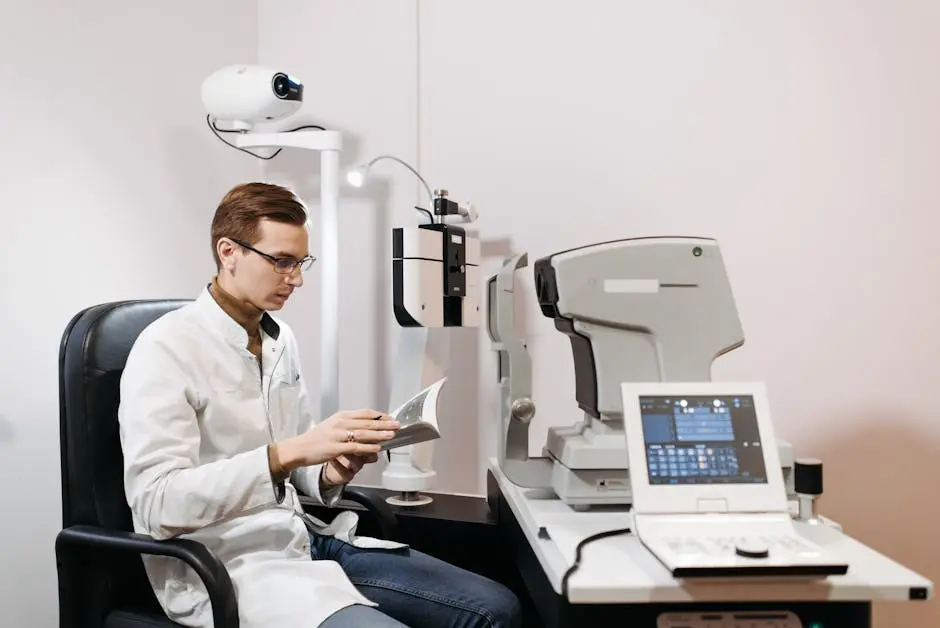
Eye care is an essential part of maintaining overall health and well-being. With so many types of eye specialists available, it’s important to understand the specific roles each plays in ensuring the best vision and eye health. In this blog, we’ll explore the various roles of eye physicians, what they do, and why they’re important to your eye care.
The General Practitioner of Eyes: Optometrists
Optometrists are a vital part of many people’s eye care journey. As the healthcare professionals trained to perform eye exams, they are adept at prescribing eyeglasses and contact lenses, as well as detecting and managing eye diseases. These specialists are essential for early diagnosis and treatment of common eye conditions like glaucoma, cataracts, and macular degeneration. It’s crucial to have your eyes checked regularly by an optometrist, as catching these issues early can prevent vision loss.
Beyond prescriptions and disease management, optometrists are often primary caregivers in eye health. They conduct exams to check for refractive errors, ensure eye health from an educational standpoint, and provide tailored eye care suggestions. Most importantly, their role includes preventive care, which is designed to catch issues that individuals may not notice. For instance, even subtle changes in vision or eye discomfort can indicate significant underlying health problems. Seeing an optometrist can often reveal early signs of diabetes and hypertension.
The Surgeons of the Eye: Ophthalmologists
Ophthalmologists differ from optometrists primarily in their surgical expertise. These medical doctors possess the advanced training necessary to perform surgeries that address severe eye issues such as cataract removal, LASIK vision correction, and retinal detachment repairs. Their scope of practice encompasses not just the diagnosis and management of conditions, but also interventions aimed at preserving or restoring sight, which might otherwise be lost without significant, timely medical attention.
Their expertise extends beyond surgery. Ophthalmologists are involved in research and development of advanced treatment methods and contribute significantly to our understanding of eye diseases. Some ophthalmologists even specialize further into subfields — from glaucoma specialists to retina experts — focusing their skills to better understand and tackle specific conditions, adding a layer of specialization that enhances their capability to handle even the most complex of cases. Their extensive training allows them to offer the latest in advancements in eye surgery technology.
Focusing on Children: Pediatric Eye Physicians
Pediatric eye physicians play a crucial role in enriching and safeguarding the vision health of our children. From infancy through adolescence, visual development is as critical as academic learning. Pediatric eye specialists address conditions like myopia, hyperopia, and astigmatism, alongside more specific childhood conditions such as lazy eye (amblyopia) and crossed eyes (strabismus), which are best treated when identified early. Given the significant impact these conditions can have on a child’s social interaction and learning environment, regular visits to a pediatric eye physician can be transformative.
They are also essential for ensuring that any vision impairments do not impede a child’s developmental milestones. Specialists provide guidance to parents on how to protect and encourage healthy eye development in everyday settings. Whether dealing with congenital eye defects, genetic disorders, or trauma-induced issues, pediatric eye physicians build a foundation for lifelong eye health. The American Academy of Pediatrics recommends early vision screening as a crucial step in proactive child health care.
Specialists in Vision Loss: Low Vision Specialists
Low vision specialists are instrumental for those experiencing vision reduction that traditional glasses or contacts cannot correct. These practitioners offer solutions beyond ordinary optical aids, leveraging specialized equipment such as magnifiers, high-powered lenses, and digital devices to optimize a patient’s remaining vision. Low vision rehabilitation can greatly impact quality of life, enabling patients to perform everyday tasks and enjoy activities they might otherwise have abandoned.
Beyond the provision of tools, they use training and adaptive techniques to help patients navigate their worlds safely and effectively. They also often collaborate with other healthcare providers to design comprehensive care plans that address the broader implications of vision loss, such as mental health impacts and lifestyle adaptations. Their work ensures that individuals can lead more independent lives, despite significant visual impairment, which is key to improving their overall quality of life.
Co-managing Eye Health: The Role of Opticians
Opticians are crucial in the fulfillment of vision prescriptions. While they do not diagnose or treat eye conditions, their expertise lies in improving quality of vision correction. By expertly fitting eyeglasses and contact lenses, opticians ensure that prescribed lenses align perfectly with the wearer’s needs. This precision in fit and adaptation of lenses not only enhances visual clarity but also boosts comfort and aesthetic satisfaction, reinforcing the link between practicality and style.
They also offer guidance on lens types and fits that best match individual lifestyles, whether for athletic pursuits, office work, or reading. This personal touch can make a significant difference in daily vision use and eye comfort, particularly when lifestyle changes prompt a switch in lens type or features, such as transition lenses or anti-reflective coatings. For those navigating complex prescriptions or seeking progressive lens solutions, opticians are indispensable in managing and executing lens options that deliver optimal results.
Choosing the Right Eye Physician for Your Needs
In conclusion, understanding the different roles of eye physicians can help you make informed decisions about your eye care. Whether it’s routine exams, vision correction, or treating complex eye diseases, each specialist plays a critical role in maintaining eye health and vision. Regular visits to the right eye care provider ensure that you receive the comprehensive care your eyes deserve. For more insights into selecting the appropriate eye care professional for your specific needs, visit our homepage where you can find all the information you need.

